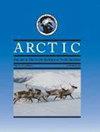Evaluating Potential Impacts of Proposed Industrial Access Road Routes on Wilderness Character in Gates of the Arctic National Park and Preserve, Alaska
IF 0.8
4区 地球科学
Q4 ENVIRONMENTAL SCIENCES
引用次数: 0
Abstract
Northern Alaska is home to the largest designated wilderness landscape in the United States and among the world’s largest remaining roadless regions. Under the 1980 Alaska National Interest Lands Conservation Act, the Alaska Industrial Development and Export Authority, a semi-public corporation of the state of Alaska, proposed an industrial road to access the Ambler Mining District that would run approximately 320 km along the southern edge of the western Brooks Range, crossing federal, state, and Native Corporation lands. Two alternative routes are being considered that cross the Kobuk Preserve portion of Gates of the Arctic National Park and Preserve, with the northern route running outside of but adjacent to Gates of the Arctic Wilderness. Both Kobuk Preserve and Gates of the Arctic Wilderness are managed by the National Park Service to preserve wilderness character under existing federal law and agency policy. This study evaluates the potential impacts of both routes on wilderness character in the Kobuk Preserve and adjacent Gates of the Arctic Wilderness. We use a hierarchical conceptual framework to identify spatially explicit measures that show the potential impacts of the road on wilderness character. The impacts from each measure are combined using a weighting scheme to generate a series of maps that quantify the potential impacts of these two proposed routes. Our results show that both routes would degrade wilderness character within the Kobuk Preserve, and that the northern route, which is the state’s preferred alternative for the road corridor, would have a significantly greater impact in terms of degrading wilderness character in the adjacent Gates of the Arctic Wilderness.评估拟议的工业通道路线对阿拉斯加北极国家公园和保护区的荒野特征的潜在影响
阿拉斯加北部是美国最大的指定荒野景观所在地,也是世界上最大的无路地区之一。根据1980年的《阿拉斯加国家土地保护法案》,阿拉斯加工业发展和出口管理局(阿拉斯加州的一家半公开公司)提出了一条通往安博勒矿区的工业道路,这条道路将沿着西部布鲁克斯山脉的南部边缘延伸约320公里,穿过联邦、州和土著公司的土地。目前正在考虑两条备选路线,穿过北极之门国家公园和保护区的Kobuk保护区部分,北部路线在北极荒野之门之外,但与之相邻。Kobuk保护区和北极荒野之门都由国家公园管理局管理,以保护现有联邦法律和机构政策下的荒野特征。本研究评估了这两条路线对Kobuk保护区和邻近北极荒野大门的荒野特征的潜在影响。我们使用一个层次概念框架来确定空间上明确的措施,显示道路对荒野特征的潜在影响。每项措施所产生的影响,均采用加权方案加以综合,生成一系列地图,量化这两条建议路线的潜在影响。我们的研究结果表明,这两条路线都会降低Kobuk保护区内的荒野特征,而北线是该州优先选择的道路走廊,在降低北极荒野之门附近的荒野特征方面会产生更大的影响。
本文章由计算机程序翻译,如有差异,请以英文原文为准。
求助全文
约1分钟内获得全文
求助全文
来源期刊

Arctic
地学-环境科学
CiteScore
2.30
自引率
0.00%
发文量
51
审稿时长
6-12 weeks
期刊介绍:
Arctic is a peer-reviewed, primary research journal that publishes the results of scientific research
from all areas of Arctic scholarship. Original scholarly papers in the physical, social, and biological
sciences, humanities, engineering, and technology are included, as are book reviews,
commentaries, letters to the editor, and profiles of significant people, places, or events of northern
interest
 求助内容:
求助内容: 应助结果提醒方式:
应助结果提醒方式:


